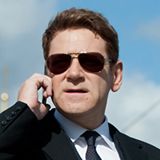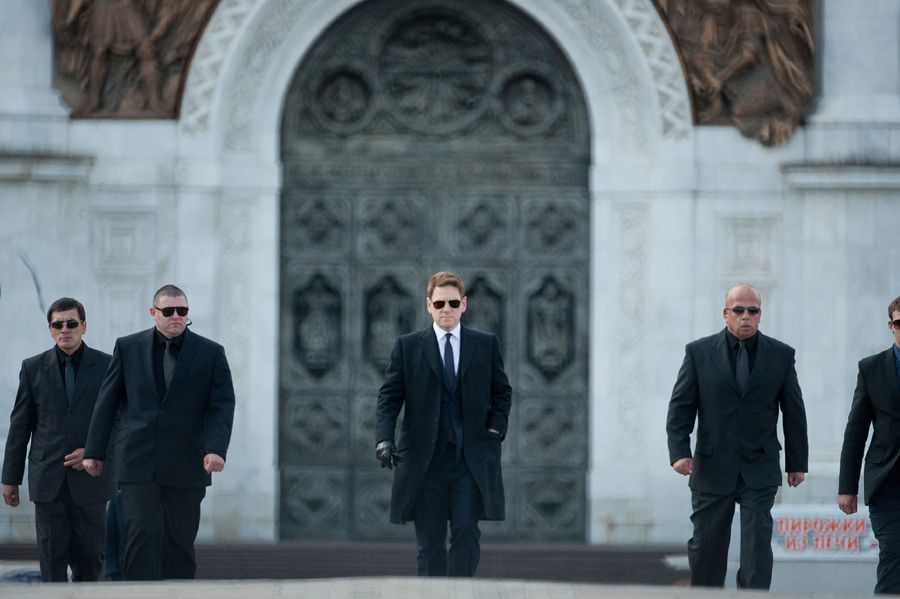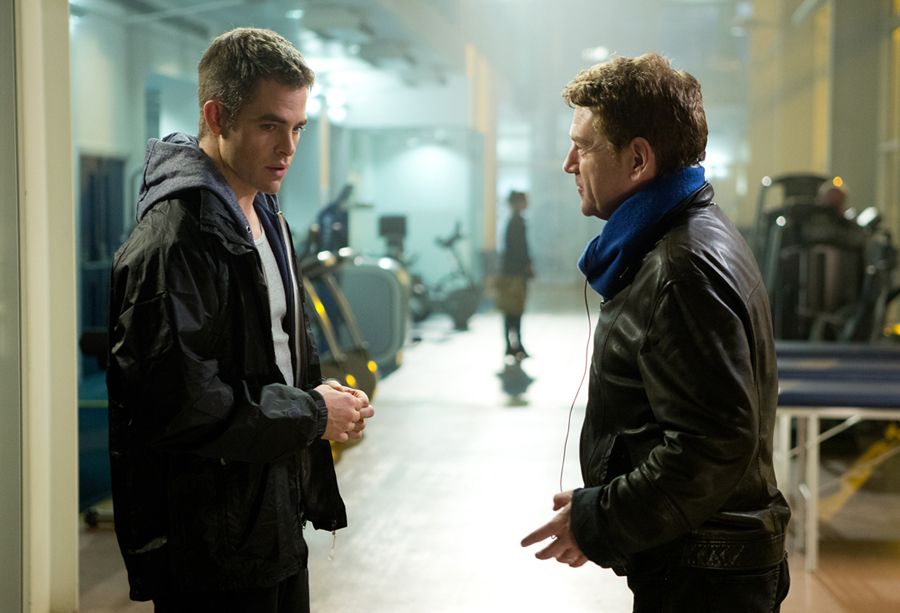Until a few years ago, Kenneth Branagh was “merely” Hollywood’s great modern purveyor of Shakespeare, having successfully adapted Henry V, Hamlet and Much Ado About Nothing, among others. But in 2011, he tackled Thor, the big-screen version of Marvel’s Norse god-turned-superhero, and his career rocketed in a new and invigoratingly unexpected direction. That film’s success led to Branagh directing Jack Ryan: Shadow Recruit, the reboot of the franchise launched in 1990 with the adaptation of author Tom Clancy’s novel The Hunt For Red October.
In Jack Ryan, Branagh pulls double duty as both director and co-star, playing a Russian spy pitted against Chris Pine’s Ryan for the fate of the free world – a callback to Cold War politics, updated to reflect the visceral and technological thrillers of the decades since its end. Speaking to press at the film’s recent Los Angeles press day, Branagh talked about the appeal of the material, and the challenges and opportunities of taking old-fashioned spy games and giving them a new twist. And as the filmmaker discussed his formative years as a performer and director, producer Mace Neufeld touched on what has helped the Ryan character endure for the better part of 25 years.
Mr. Branagh, this character and this milieu come from a sort of very different era historically, culturally, and geopolitically. What were the pleasures and challenges of bringing Mr. Ryan into this age?
Kenneth Branagh: Well, I loved the previous pictures and the books. I like the Cold War era and the big sort of elemental standoff between, in this case, Russia and America, and east and west and old and new and old empires and new empires. One of the excitements about trying to reimagine it was finding a world, so the interconnectivity of the financial markets was one that was both interesting and a bit of a brain teaser for me. Chris was very good at understanding it, thank god. But to be able to put Jack Ryan there at a time when it was a different kind of elemental face off between Russia and America, and where one tiny event in one part of the world can so, you know, dramatically and catastrophically influence a larger event elsewhere with that same, for me, sort of good, principled, moral-conscioused man in a very much dirtier world. For me, that was pretty interesting, and although Chris is right to say that the story and the plot in these pictures is very important, for me it was a huge, huge pleasure to work with these two great actors, to be able to also follow what also, I think, is a big part of it is watching them think and deal with it in a layered way, the human dimension of the story, as portrayed by these fellows, was a huge pleasure for me in trying to make the movie.
For Kenneth, I wanted to commend you on your Russian. Can you talk a little bit about speaking the language?
I got to, a long time in advance, started to listen to, you know, Russian television, Russian radio. I had a dialect coach who just introduced me to the just the sound of the language. I wasn’t really familiar with all its varieties, its tone is a bit different, a little less range, and then I learned it phonetically while walking the dog. We have a dog in this movie, the next dog in the next Jack Ryan film, if there is one, will be my dog, who can now speak Russian (laughs). So I’m looking forward to seeing her in that.
Kenneth, you’re an English actor who plays a Russian and who made a film about the CIA. What did you pay attention when you were making this film?
I remember seeing Hunt for Red October when I did my second movie, which was a thriller for Paramount, which of course Mace was behind, as he was all of them. And when this came along, in fact, it was a combination of things, I knew that Chris was involved and I very much wanted to work with him, very much admired him, and Mace and Lorenzo’s [di Bonaventura ] track records, and the chance to do something, to make a film where – I wanted to make a movie having grown up loving them where a man passes on information to another man in a cinema, where two men meet on a bench at night in Moscow and talk about the fate of the world, while a dog is distracting people from thinking that they’re doing anything nefarious, and you know, combine action/thriller with working with great actors.
Kevin [Costner] talked about his character being a mentor. Was it easier to be mentored in 1983 or ‘84 than it would be in 2014? Do you think that was an easier time for an old shoe to tell a new shoe what to do and what the pitfalls were? And who mentored you?
It’s a very interesting question. I think, you know, if there’s openness of communication, then the timing doesn’t really matter, and sometimes, you know, the mentoring doesn’t really happen directly, you know, it just happens intuitively, and I certainly found that, you know, working with Kevin on this. There was a lot of things – I was so grateful to have a master director on the set. There was just lots of moments where effortless, not advice, not as sort of obvious as advice, but just shared communication about things, a conversation about how a moment in a scene might go or how things might be approached that came out of a sort of, you know, honest collaboration. I think if that honesty of communication exists, whether it’s ’84 or 2014, I think it’s quite marvelous, actually, and watching these two together was great as well, in terms of just the – when people trust each other and when they’re very good at what they do, and when their egos are at the service of the better idea, and what is right for the scene, and when you see that kind of generosity at work, it really is a thrilling thing to be part of and actually that cuts across age, doesn’t need older, younger, just ‘cause I learn a lot from people much younger than me as well as people much older than me, so I think it’s about honesty and generosity and we were lucky to be in an atmosphere on this project across this table, as it were, where that was at work.
Who was your greatest mentor?
Who’s my greatest mentor? He was the guy who was the principal of the drama school I attended, and for the first six or seven pictures I made, he was on the movie as the acting coach, and I’ll give you a quick example of what he did for me. He was a very eccentric English guy. We were making a film of Hamlet, I was doing the “To be or not to be” soliloquy, I was very nervous. I said to him that day, I said, “Look, this is the acting Olympics, Hugh, I’m doing the most famous speech in Western dramatic literature. If you have any notes for me, I’d like them very early on, please.” So we started doing it, I did take one, “How was that?” He said, “I don’t have anything to say.” I did take two, take three, he didn’t have anything to say. I said, “Look, I think I’m getting there. Now I’m going to call this a print very shortly.” He said, “I think you should do another one.” “Did you have anything to say?” “Not at the moment,” he said. So we get to take six and I said, “Hugh, you know, I think we might have it. Do you have anything to say?” He said, “Well,” he said, “Yes, yes, yes. The rhythm of it absolutely, absolutely extraordinary, the understanding of the language, fantastic. The pacing of it, marvelous. The timing of it, really extraordinary.” I said, “What’s the problem?” He said, “I simply don’t believe a word you say.” [Laughter] “You have absolutely no sense of the man, it’s phony, it’s fake, it’s acting, it’s showing off. You really have to do another one.” So he was – with a guy with those balls, close to, it was very helpful, so he was my greatest mentor.
And for Kenneth or Mace Neufeld, what do you think it is about the character that Tom Clancy created all those years ago, Jack Ryan, that people still can’t get enough of this guy after 30 years?
Mace Neufeld: I think he’s referred to in Clear and Present Danger disparagingly as a Boy Scout, but those qualities that a Boy Scout is supposed to have -- On my honor I’ll do my best to do my duty to God and my country and help old ladies across the street and learn how to start a fire with two pieces of wood -- those are qualities that appeal. Number two, he’s really smart, he’s got this great ability to process information very quickly and jump to a conclusion before most people, and then have to defend his conclusion. And the third this is I think he’s somebody you’d like to have as a friend, particularly living in the house next door to you because if your house started to burn down, and you were on the second floor and you had to throw your baby out of the window, you knew that Jack would catch it. So those are three of the qualities I think that appeal to people.
Jack Ryan: Shadow Recruit opens Friday nationwide.



